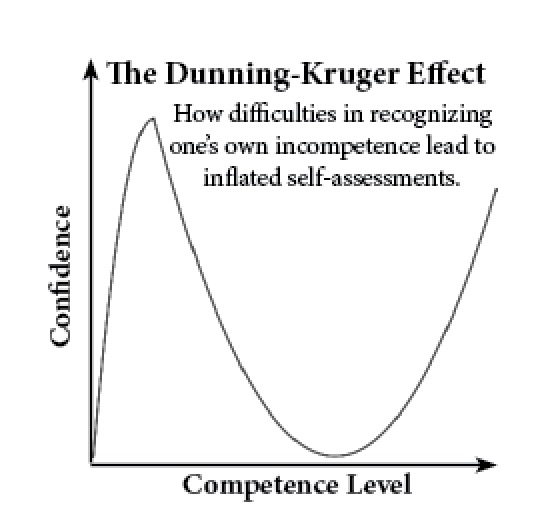
Do you over-estimate or under-estimate your intelligence? As you passed through puberty and moved progressively toward adulthood, you observed your burgeoning physical and intellectual power. Suddenly, you were towering above some of the adults whom you had looked up to all your life, and your understanding of the world around you was growing in leaps and bounds. It was easy to extrapolate the rapid improvement of your capabilities into the future and believe that there were few limits to what you could attain. Mark Twain described this unfettered confidence in his famous reflection, “When I was a boy of 14, my father was so ignorant I could hardly stand to have the old man around. But when I got to be 21, I was astonished at how much the old man had learned in seven years.”
This overconfidence experienced by the young as they emerge from puberty into adulthood was captured in a famous study by Justin Kruger and David Dunning at Cornell University. The reasearchers administered a 20-item test on logical reasoning skills to 45 undergraduates. After the test, the students were asked to estimate:
• their percentile rank in logical thinking relative to all their classmates
• their score on the test (as a percentile) relative to all their classmates
• how many questions out of the 20 that they answered correctly.
On comparing the actual test score of each student with his or her perceived logical ability relative to others, the researchers reported:
Participants in general overestimated their logical reasoning ability, and it was those in the bottom quartile who showed the greatest miscalibration.
The data showed that those with the lowest level of competence in logical reasoning were the most overconfident in their abilities. This result, now known as the Dunning–Kruger effect is displayed in the downward dip in the graph as competence increases. The upward swing in the curve shows that overconfidence was less pronounced among those of higher logical ability. Although individuals with the greatest logical reasoning ability had more confidence than average, they overestimated the abilities of others, and therefore underestimated their own ability relative to others. In a 2004 study that was expanded to include a broad variety of intellectual and physical skills, Dunning et al. found:
The correlation between self-ratings of skill and actual performance in many domains is moderate to meager…People overrate themselves. On average, people say that they are “above average” in skill (a conclusion that defies statistical possibility), overestimate the likelihood that they will engage in desirable behaviors and achieve favorable outcomes, furnish overly optimistic estimates of when they will complete future projects, and reach judgments with too much confidence.
Though we usually develop more humility as we age and discover that the world is much more complicated than first thought, the Dunning-Kruger effect continues to play out in areas where we have limited expertise, because lacking it prevents us from recognizing our missing knowledge or skills. For example, the study found that 88% of car drivers rate themselves as better-than-average in driving.However, if the evaluations were performed by the spouse in the passenger seat, the average driver would probably receive a worse-than-average score (of course, each of these is statistically impossible). Similarly, it has been found that people of below-average intelligence tend to overestimate their IQ, while those who are intellectually above average tend to underestimate theirs. These are all examples of what social psychologists call illusory superiority–in essence, a version of survivorship bias resulting from the fact that the information we are missing is precisely what we require in order to recognize how much we don’t know.
For addition information on the Dunning-Kruger effect visit: https://www.ted.com/talks/david_dunning_why_incompetent_people_think_they_re_amazing/transcript?language=en#t-31833
